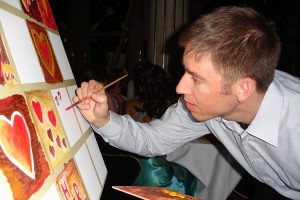
Recovery is complex, and it requires us to turn inwards. Behind addictive behavior is often unresolved trauma, suppressed emotions, and wounded parts of ourselves. Creative expression can help aid in recovery from these.
It can be very difficult for one to put into words their pain that they have spent so long numbing. This difficulty is no direct flaw of the individual; rather, the effects of adverse life experiences create barriers to verbal processing and healing.
Some of the unresolved pain one is carrying could have occurred before language was developed, and therefore the ability to put it into words is absent. Additionally, trauma and adverse life events can hinder one’s ability to make sense of what has happened or how they are feeling.
Creative Expression in Recovery
This is why the use of art and creative outlets in addiction recovery are important to a holistic approach that actively engages all parts of ourselves.
Creative expression expands past the visual arts one may think of when they hear creativity or art. The use of creativity in the context of healing includes all forms of human expression: visual art [drawing, painting, collage, etc.], drama, writing and storytelling, clay works, singing, music, and movement.
Stuckey & Nobel (2010) [1], point out that professionals within the medical field have begun to validate the role creative expression plays in the healing process. Creativity activates different parts of our brain, compared to verbal processing alone, and the free-form process encourages one to challenge self-criticism and increases self-evaluation.

Additionally, Sack (2017) [2] shares that through creative therapies, such as art or music therapy, individuals are able to better express strong and difficult emotions or memories. This is due to the use of symbols and imagery found in creative expressions and how these components are easily processed and understood by everyone.
When addressing addiction, one must acknowledge the shame and stigma experienced by those who are suffering and how this can impact one’s self-evaluation and identity. According to Sack (2017), “Addicts carry a great deal of guilt and shame that can be difficult to put into words.
Creative approaches can help them process these feelings so they don’t trigger a relapse”. Engaging in creative outlets can increase positive self-evaluation through the act of achievement.
When we complete a task, we feel accomplished and proud of ourselves. The positive impact on one’s self-evaluation can start the formation of an identity outside of the addiction, which provides the individual with something tangible to hold onto.
Exploring the Creative Side
For those who may be reading this and have not explored the creative side of recovery, below is a simple creative expression activity that you can follow at home. This directive is meant to help you become more familiar with your emotions, especially those that are often suppressed.
- Take a piece of paper and fold it into fourths.
- Identify four emotions you would like to work with today, preferably two that are easier to engage with, and two that are more difficult. Once you have chosen, designate an emotion to a box.
- Using available art supplies [crayons, colored pencils, markers, paint, pastels, etc.] spend three minutes with each emotion, creating an abstract representation of the emotion. It does not need to be a picture of something; it can be: a chaotic scribble, use of symbols or shapes, use of colors that represent the emotion, or bold words surrounded by scribbles.
- In between each emotion, take one to two minutes to reset and become centered before moving onto the next.
- After completing all four emotions, give yourself five to ten minutes to reflect upon any new insight you gained, regarding your emotions. Be sure to document anything that came up for you, especially any barriers that arose.
- Repeat this process with as many emotions as you would like.
Resources:
[1] Stuckey, H. L., & Nobel, J. (2010). The connection between art, healing, and public health: a review of current literature. American journal of public health, 100(2), 254–263. https://doi.org/10.2105/AJPH.2008.156497
[2] Sack, D. (2017, October 24). 7 Ways Creativity Supports Addiction Recovery. Retrieved September 30, 2020, from https://www.psychologytoday.com/us/blog/where-science-meets-the-steps/201710/7-ways-creativity-supports-addiction-recovery
About the Author:
 Jessica Boghosian, ACSW, is a Registered Associate Clinical Social Worker and a Clinical Therapist at Bright Road Recovery in Claremont, CA. She lives for the present moment and shares her warmth and joy at every chance she gets. Jessica currently works with individuals with eating disorders at various levels of care, including Residential, Partial Hospitalization, Intensive Outpatient, and Outpatient. She also works with individuals with other mental health diagnoses at an outpatient level of care.
Jessica Boghosian, ACSW, is a Registered Associate Clinical Social Worker and a Clinical Therapist at Bright Road Recovery in Claremont, CA. She lives for the present moment and shares her warmth and joy at every chance she gets. Jessica currently works with individuals with eating disorders at various levels of care, including Residential, Partial Hospitalization, Intensive Outpatient, and Outpatient. She also works with individuals with other mental health diagnoses at an outpatient level of care.
She holds a Master’s in Social Work from the University of New England and is currently working towards licensure. Jessica’s love for her work with patients at Bright Road Recovery is clear to see. She aims to meet each patient where they are at and walks beside them in their journey to recovery. Jessica honors each patient’s individual journey and dedicates herself to increasing their love of life and themselves.
The opinions and views of our guest contributors are shared to provide a broad perspective of addictions. These are not necessarily the views of Addiction Hope, but an effort to offer a discussion of various issues by different concerned individuals.
We at Addiction Hope understand that addictions result from multiple physical, emotional, environmental and genetic factors. If you or a loved one are suffering from an addiction, please know that there is hope for you, and seek immediate professional help.
Published on October 19, 2020
Reviewed by Jacquelyn Ekern, MS, LPC on October 19, 2020
Published on AddictionHope.com
